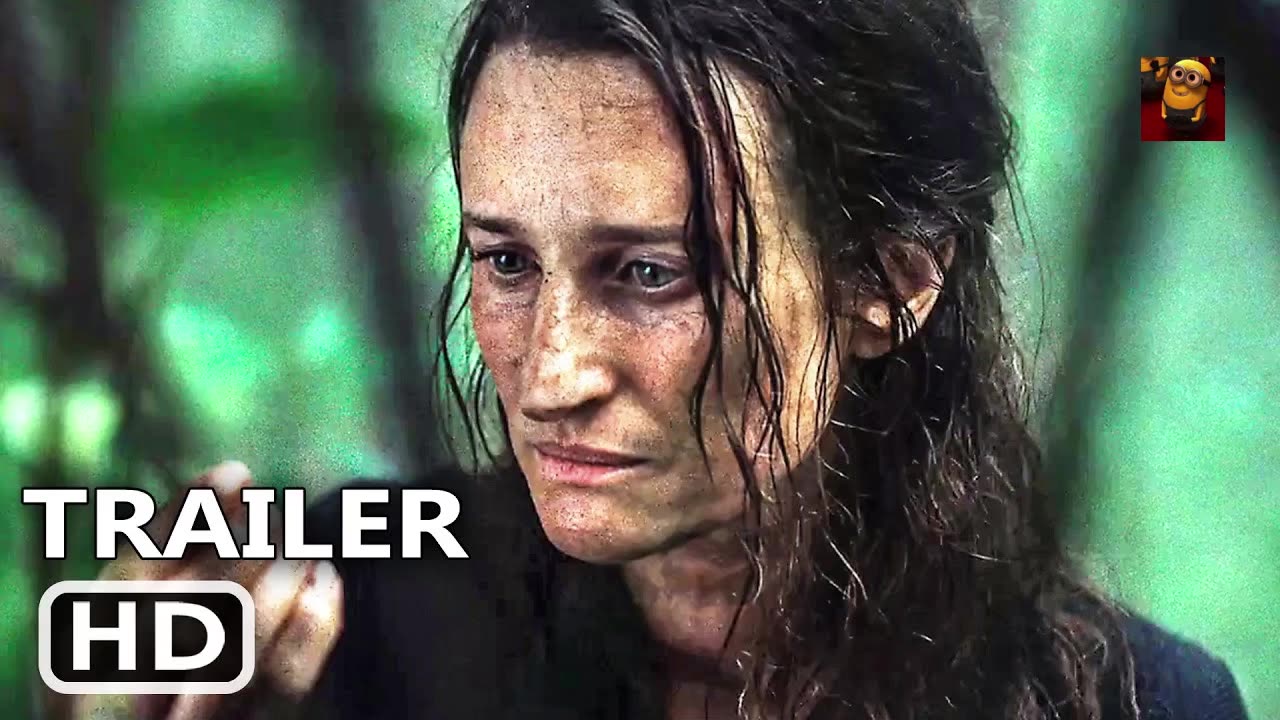Premium Only Content

NO CHAINS, NO MASTERS Trailer (2024) Camille Cottin, Benoît Magimel
NO CHAINS, NO MASTERS Trailer (2024) Camille Cottin, Benoît Magimel
NO CHAINS, NO MASTERS Trailer (2024) Camille Cottin, Benoît Magimel
© 2024 - Studio Canal
Unlike her disillusioned father Massamba (Ibrahima Mbaye), 16-year-old Mati (Anna Diakhere Thiandoum) refuses to keep her head down and accept her fate.
One night she flees from the plantation, hoping to escape violence and seek freedom in a remote part of the island, where a community of fugitives is said to live. As the plantation owner (Benoît Magimel) hires the merciless slave hunter Madame La Victoire (Camille Cottin) and her sons to pursue Mati, Massamba realises the brutal consequences awaiting his daughter if she’s captured.
He has no choice but to break his chains and set off on a desperate search for her. As a relentless hunt ensues in the island’s unforgiving jungle, the father and daughter forever break away from the colonial order.
French screenwriter and director Simon Moutaïrou spent summers as a teenager in his father’s native country of Benin in West Africa.
Etched on his memory from this time are the trips to its so-called slave coast and port city of Ouidah, through which more than one million Africans passed in the 18th and early 19th centuries ahead of being transported overseas for a life of slavery.
“There is an enormous red brick arch commemorating these deportations, ‘The Door of No Return’,” says Moutaïrou.
Related Stories
Julia Roberts To Be Feted With France's Honorary César Award
French Actor & Director Nicolas Bedos Faces One-Year Suspended Sentence For Sexual Assault & Harassment
“I couldn’t get my head around this idea of such inequality between people, or human beings being treated like animals. When my father or uncles talked to me about what had happened, my adolescent spirit couldn’t fathom it … but it always stayed in the back of my mind.”
Watch on Deadline
00:00
00:58
Some 20 years on, Moutaïrou’s feature directorial debut No Chains, No Masters is making waves in France as the first local production in decades to tackle the country’s involvement in the slave trade.
“There have been dozens of films about slavery out of America but very few out of France, two or three maybe, and then 30 years ago,” he comments.
Set in Mauritius in the mid 18th century, when the Indian Ocean Island was under French rule, No Chains, No Masters lays bare the brutal treatment of imported African slaves working on its sugar plantations, but also offers a universal tale of resistance in the face of oppression.
Senegalese actor Ibrahima Mbaye (Atlantics, Wara) and newcomer Anna Diakhere Thiandoum co-star as Massamba and Mati, a father and daughter enslaved on a plantation, who rebel against its regime of violence and make a perilous bid for freedom.
Benoît Magimel also features in the cast as a ruthless plantation owner, alongside Camille Cottin, in a rare baddie role as domineering slave catcher Madame La Victoire. Félix Lefebvre and Vassili Schneider play her character’s sons.
This first feature for Moutaïrou follows a successful screenwriting career, with credits including Julien Leclercq’s action thriller The Assault and The Crew; Xavier Gens’ bachelor party comedy Budapest, Yann Gozlan’s aircraft crash mystery-thriller Black Box and environmental thriller Goliath.
The production is also a career landmark for lead producer and ex-Studiocanal exec Nicolas Dumont, as his first project to reach fruition since joining forces with Hugo Sélignac at Mediawan’s Paris-based production company Chi Fou Mi.
Main backer Studiocanal is launching the film in France on 300 prints today and has also secured a raft of early international deals to Benelux (O’Brother), Switzerland (Frenetic Films), Portugal (Outsider Films), Scandinavia (Scanbox Entertainment), Iceland (Myndform), Eastern Europe, excluding Poland and ex-Yugoslavia (Prorom) and CIS (Exponenta).
Pathé BC Afrique will handle the release into French-speaking Africa, while ICC and Maurefilms have jointly acquired rights to the islands of La Reunion and Mauritius.
Simon Moutaïrou
Mika Cotellon
The release marks the culmination of a 15-year creative journey for Moutaïrou who came across the story of the community of runway slaves, or Maroons, during a trip to Mauritius in 2009.
“I was walking on the southwest of the island when I came across an immense mountain facing the sea called the Le Morne Brabant. While I was having lunch with my wife, a creole lady told us about its history and how during the time of French rule, slaves had fled the plantations, extricating themselves from the colonial system, and gathered on the summit of the mountain,” he recalls.
Moutaïrou loved the story and on his return to Paris started doing more research, discovering that the mountain was classed as a UNESCO World Heritage Site and a symbol of marronage, or resistance to slavery.
“We all know slavery existed, what is less explored is that wherever slavery existed, there was always also resistance,” he says. “There’s an aspect of the story that could appeal to everyone whatever their age or colour, for what it says about human dignity and resistance to oppression.”
ADVERTISEMENT
Dumont says this angle was a driving force in the project.
“What was important for us was to restore a form of pride to these characters by truly making them the subjects of the film, rather than portraying them uniquely as victims,” he says.
“The Maroons are the real subjects as they revolt and take their destiny into their own hands… in a story of rebellion that is as relevant today, as it was yesterday and will be tomorrow.”
The protagonists of Massamba and Mati also chime with the pair’s ambition to create authentic black heroes and heroines.
“That was our original pact with François Mergier and Anna Marsh at Studiocanal,” says Moutaïrou, referring to the studio’s head of French production and CEO. “My model growing up was Denzel Washington. As an adolescent in France in the 1990s, our heroes were American. We were lacking in black heroes, although it’s changed a bit since then.”
He and Dumont heap praise on Mbaye and Thiandoum for their performances.
“Anna came to the casting in Senegal with a friend and Simon selected her out of 500 young women. She had never acted before but brought such incandescence, such force,” comments Dumont.
No Chains, No Masters
Chi Fou Mi
The producer also salutes Mbaye for taking on the psychologically tough role of Massamba.
“We were doing an initial reading of the script with Ibrahima in Paris. When the N-word was pronounced he left the room,” recounts Moutaïrou.
“No one really knew what was happening to him, but he needed take on the weight of this slave journey on his shoulders… He is one of West Africa’s best-known actors, but there was something in the role that was bigger than him… it was more than just a film for him.”
Moutaïrou cites his admiration for U.S. slavery-themed pictures such as 12 Years A Slave, Django Unchained, Amistad and Mandingo, but says he was keen to make a film that had its own flavor.
“We needed to find our own voice… which we found through the film’s Africanity. The African language Wolof is spoken in the film, along with other African languages,” he says.
“In France, with our multi-faceted identity and the waves of immigration which made France what it is today, we were able to make a film that is authentically African in its heart, that differentiates it from the American films.”
No Chains, No Masters
Chi Fou Mi
At the same time as being an inspirational story, the film also plunges the spectator into the brutal treatment of slaves on the sugar plantations.
“Nicolas and I talked about this a lot. We felt showing the entire picture, reinforced the beauty of this fragile community on the top of the mountain. It was important to show where they came from and the concentration camp-like horror of the slave system,” says Moutaïrou.
The violence in the film echoes scenes capturing the abuse of African slaves in Ava Duvernay’s Origin, in protagonist Isabel Wilkerson suggests a connection between the treatment of Black people under the transatlantic slave trade and the suffering of the Jewish people in the Holocaust.
“I haven’t seen the film, but I agree with the comparison in the sense that the transportation of the slaves and the plantations are dark spots in history. These are moments in history like the gas chambers, where humanity completely disappeared,” comments Moutaïrou.
ADVERTISEMENT
“I draw a lot of inspiration from West Indian literature,” he adds, then recalling the words of the late Martinique writer and poet Édouard Glissant. “He wrote that in the hold of the slave ship, he could have said it of the plantations too, no god, no belief, no scarification, which was the mark of their faith, could explain what was going on.”
“It is the role of cinema to make these dark points in history real. That used to be an inherent part of cinema, this political aspect. Today that’s less the case but we need to talk about our past, because it’s part of what we are today.”
This view on cinema’s political responsibility chimes with Dumont, who spent eight years working for environmentally-focused director Jacques Perrin’s production company Galatée Films early on in his career.
ADVERTISEMENT
“When Simon plunged into the archives of the period, looking for accounts from Maroons. What he found was stories of survival, talking about the violence on the plantations, the hunger, the dogs that pursued them as they hid in the forests. There could be no complacency in the way violence is shown, but it still had to be shown.”
Beyond the hard-hitting subject-matter and ambitions for the film, No Chains, No Masters is also made for a mainstream audience, with Montaïrou tapping into his genre-writing experience to include action-thriller and fantasy elements in the storytelling.
The $8.6M (€7.8M) production shot in May and June of 2023 on location in Mauritius, where it faced the challenge of unseasonably wet weather.
“The Mauritians had told us it was the wedding season but then we had a typhoon, mudslides and torrential rain… on top of what was already a complex shoot, given it was on an island, with animals, arms, children, costumes and scenes at sea,” says Dumont.
“I could deal with anything in terms of production now… it was my Lost in La Mancha moment… but in many ways, at the same time, these challenges united everyone involved in the film even more.”
In spite of the strong performances and topicality of France’s slavery heritage , neither Cannes nor its parallel sections, nor the fall festivals selected the film. Moutaïrou and Dumont are not dwelling too heavily on this fact
“Perhaps the combination of arthouse and genre made it difficult to place, it’s hard to say… we’ve moved on and are focusing on the release. It’s true that a festival selection can help add color to a local release, but there are plenty of films that exist outside of the festival circuit,” comments Dumont.
The film is releasing amid a bumpy political period for France, and at a time when the country is questioning its past and future trajectory as well as its sense of national identity.
ADVERTISEMENT
Moutaïrou suggests this makes for perfect timing, even if the brutality shown in the film could provoke anger in some quarters.
“I couldn’t be prouder that the film is coming out in this political context. We’ve had the European elections, the French parliamentary elections, the Olympic Games. It’s been a long time since France has talked so much about its identity and what France is,” he says.
“I hope it will spark debate. Perhaps there will be even anger, related to the beginning of the film, but if that happens, I believe the film will ultimately have a cathartic effect.”
Simon Moutaïrou, the critically acclaimed screenwriter behind the spy thriller hit “Black Box,” has partnered with some of France’s biggest players — leading producer Chi-Fou-Mi (“November,” “All Your Faces”) and Studiocanal — on his ambitious directorial debut, “No Chains, No Masters.”
Now in post, “No Chains, No Masters,” is an epic movie inspired by historical accounts of former slaves in West Africa, nicknamed Maroons, who emancipated themselves from French settlements.
Set in 1759, in the French colony of Mauritius Island, “No Chains, No Masters” is an epic historical drama following a father, Massamba (Ibrahima Mbaye Thié), and his fierce teenage daughter Mati (Anna Thiandoum) who defy all odds to survive a manhunt across the jungle and emancipate themselves from the hell of a colonial plantation.
Related Stories
An Emmy statue with arrows going through it
VIP+
‘Hacks’ Post-Emmys Boost Highlights Max’s HBO Problem
Ifa Isfansyah
Kamila Andini’s ‘Four Seasons in Java,' Riri Riza's 'Cubs' Adorn Slate of Indonesian Indie Producer Forka Films (EXCLUSIVE)
The story revolves around Mati, who refuses to accept her fate and flees from the plantation, hoping to seek freedom in a remote part of the island, where a community of fugitives is said to live. As the plantation owner (Benoît Magimel) hires the merciless slave hunter Madame de la Victoire (Camille Cottin) and her sons to pursue Mati, Massamba has no choice but to break his chains and set off on a desperate search for her. As a relentless hunt ensues in the island’s unforgiving jungle, the father and daughter forever break away from the colonial order.
It marks the first big-scale narrative French movie in recent history which sheds light on slavery in French colonies. It’s produced by former Studiocanal senior executive Nicolas Dumont and Hugo Selignac at Chi-Fou-Mi, a Mediawan banner which is nominated for nine Cesar Awards. Studiocanal (“The Animal Kingdom”) financed the movie and is repping international rights. French public broadcaster France Televisions has also pre-bought it. Studiocanal will present a promo reel at the European Film Market.
ADVERTISEMENT
Speaking to Variety on the eve of the EFM, Moutaïrou told Variety that “No Chains, No Masters” was a personal project dating back to his childhood in Benin, another former French colony in West Africa which used to be called the Kingdom of Dahomey.
“When I was a child, I remember playing on the beach with my brother and seeing this big door, like a red monolith called the ‘Gate of No Return,’ facing the ocean,” Moutaïrou says. “I knew it was memorial to the enslaved Africans who were deported, so I kept imagining how so many men, women, children and entire families had been deported and swallowed by the sea.”
“Slavery is a big part of Benin’s history and it’s something that we discussed a lot with my father and with my family, so I knew that my very first movie would be about this topic,” Moutaïrou says.
The shoot of the movie, which took place on location in Mauritius Island in the Indian Ocean, was itself epic, notably due to a violent tropical storm. Moutaïrou, who worked closely with historians, hired many non-professionals who speak Wolof, the native language spoken by a large ethnic group in West Africa. Thiandoum, who plays Mati, was picked from the 500 young women who auditioned in Dakar and had never acted before. Mbaye, meanwhile, is a famous Senegalese stage actor who starred in Mati Diop’s Cannes-prizewinning “Atlantics.”
ADVERTISEMENT
“It was important for me to be as close to the truth as possible because cinema’s role is to fill the gaps of historical representations,” says Moutaïrou, who admits that he wishes he had learned more about slavery when he was younger. “I didn’t have any icons, my imagination lacked representation and that’s why movies are meant to represent myths and legends.” Moutaïrou says a few movies about slavery by Guy des Deslauriers, Med Hondo and Euzhan Palcy were made in the 1970s and 1980s in France, but nothing much since then.
ADVERTISEMENT
Dumont shares Moutaïrou’s perspective on the dearth of representation of France’s colonial past in popular culture. “American filmmakers have tackled slavery for the last 20 to 30 years, but France hasn’t truly addressed this chapter of colonialism … I think it’s a symptom of a larger issue,” he says.
“We hope that with this film we will be able to awaken consciousness and tell younger generations about this painful period of French history,” Dumont says. Slavery was abolished in France in 1794 amid the Revolution.
ADVERTISEMENT
Moutaïrou points out there are many difference between the slavery practices in the Americas and West Africa. “In French settlements, the foremen were Black, there weren’t white men as in cotton plantations in the United States. It’s true that we talk about ‘Twelve Years a Slave’ and ‘Django,’ but our films tells a different world, one that is authentically French,” says the filmmaker, adding that he hopes “No Chains, No Masters” will form a bridge with the French films that were made in the ’70s and ’80s.
ADVERTISEMENT
The helmer says he was also drawn to tell this story because it revolves around Maroons, who set themselves free and established their own settlements.
“Ultimately, ‘No Chains, No Masters’ is timely because it’s a movie about saying ‘no’ and coming out of a system of domination, whether it’s gender-related or economic,” Moutaïrou says. “It’s about standing tall at that time and today.”
“No Chains, No Masters” also has a “feminist dimension,” says Dumont, because it’s “driven by many heroic female characters, from Mati to her mother, who dies in the ship because she refuses to become a slave.”
The film was scored by Amine Bouhafa, the composer of the Oscar-nominated “Timbuktu,” and lushly lensed by Antoine Sanier (“Totems”). The key crew also includes production designer David Bersanetti (“Get In”) and costume designer Pierre-Jean Larroque, who previously worked on “Lost Illusions.”
Here are some first-look stills of the movie:
Read More About:
Chi-Fou-Mi, Studiocanal
French screenwriter and director Simon Moutaïrou spent summers as a teenager in his father’s native country of Benin in West Africa.
Etched on his memory from this time are the trips to its so-called slave coast and port city of Ouidah, through which more than one million Africans passed in the 18th and early 19th centuries ahead of being transported overseas for a life of slavery.
“There is an enormous red brick arch commemorating these deportations, ‘The Door of No Return’,” says Moutaïrou.
Related Stories
Julia Roberts To Be Feted With France's Honorary César Award
French Actor & Director Nicolas Bedos Faces One-Year Suspended Sentence For Sexual Assault & Harassment
“I couldn’t get my head around this idea of such inequality between people, or human beings being treated like animals. When my father or uncles talked to me about what had happened, my adolescent spirit couldn’t fathom it … but it always stayed in the back of my mind.”
Watch on Deadline
00:00
01:00
Some 20 years on, Moutaïrou’s feature directorial debut No Chains, No Masters is making waves in France as the first local production in decades to tackle the country’s involvement in the slave trade.
“There have been dozens of films about slavery out of America but very few out of France, two or three maybe, and then 30 years ago,” he comments.
Set in Mauritius in the mid 18th century, when the Indian Ocean Island was under French rule, No Chains, No Masters lays bare the brutal treatment of imported African slaves working on its sugar plantations, but also offers a universal tale of resistance in the face of oppression.
Senegalese actor Ibrahima Mbaye (Atlantics, Wara) and newcomer Anna Diakhere Thiandoum co-star as Massamba and Mati, a father and daughter enslaved on a plantation, who rebel against its regime of violence and make a perilous bid for freedom.
Benoît Magimel also features in the cast as a ruthless plantation owner, alongside Camille Cottin, in a rare baddie role as domineering slave catcher Madame La Victoire. Félix Lefebvre and Vassili Schneider play her character’s sons.
This first feature for Moutaïrou follows a successful screenwriting career, with credits including Julien Leclercq’s action thriller The Assault and The Crew; Xavier Gens’ bachelor party comedy Budapest, Yann Gozlan’s aircraft crash mystery-thriller Black Box and environmental thriller Goliath.
The production is also a career landmark for lead producer and ex-Studiocanal exec Nicolas Dumont, as his first project to reach fruition since joining forces with Hugo Sélignac at Mediawan’s Paris-based production company Chi Fou Mi.
Main backer Studiocanal is launching the film in France on 300 prints today and has also secured a raft of early international deals to Benelux (O’Brother), Switzerland (Frenetic Films), Portugal (Outsider Films), Scandinavia (Scanbox Entertainment), Iceland (Myndform), Eastern Europe, excluding Poland and ex-Yugoslavia (Prorom) and CIS (Exponenta).
Pathé BC Afrique will handle the release into French-speaking Africa, while ICC and Maurefilms have jointly acquired rights to the islands of La Reunion and Mauritius.
Simon Moutaïrou
Mika Cotellon
The release marks the culmination of a 15-year creative journey for Moutaïrou who came across the story of the community of runway slaves, or Maroons, during a trip to Mauritius in 2009.
“I was walking on the southwest of the island when I came across an immense mountain facing the sea called the Le Morne Brabant. While I was having lunch with my wife, a creole lady told us about its history and how during the time of French rule, slaves had fled the plantations, extricating themselves from the colonial system, and gathered on the summit of the mountain,” he recalls.
Moutaïrou loved the story and on his return to Paris started doing more research, discovering that the mountain was classed as a UNESCO World Heritage Site and a symbol of marronage, or resistance to slavery.
“We all know slavery existed, what is less explored is that wherever slavery existed, there was always also resistance,” he says. “There’s an aspect of the story that could appeal to everyone whatever their age or colour, for what it says about human dignity and resistance to oppression.”
ADVERTISEMENT
Dumont says this angle was a driving force in the project.
“What was important for us was to restore a form of pride to these characters by truly making them the subjects of the film, rather than portraying them uniquely as victims,” he says.
“The Maroons are the real subjects as they revolt and take their destiny into their own hands… in a story of rebellion that is as relevant today, as it was yesterday and will be tomorrow.”
The protagonists of Massamba and Mati also chime with the pair’s ambition to create authentic black heroes and heroines.
“That was our original pact with François Mergier and Anna Marsh at Studiocanal,” says Moutaïrou, referring to the studio’s head of French production and CEO. “My model growing up was Denzel Washington. As an adolescent in France in the 1990s, our heroes were American. We were lacking in black heroes, although it’s changed a bit since then.”
He and Dumont heap praise on Mbaye and Thiandoum for their performances.
“Anna came to the casting in Senegal with a friend and Simon selected her out of 500 young women. She had never acted before but brought such incandescence, such force,” comments Dumont.
No Chains, No Masters
Chi Fou Mi
The producer also salutes Mbaye for taking on the psychologically tough role of Massamba.
“We were doing an initial reading of the script with Ibrahima in Paris. When the N-word was pronounced he left the room,” recounts Moutaïrou.
“No one really knew what was happening to him, but he needed take on the weight of this slave journey on his shoulders… He is one of West Africa’s best-known actors, but there was something in the role that was bigger than him… it was more than just a film for him.”
Moutaïrou cites his admiration for U.S. slavery-themed pictures such as 12 Years A Slave, Django Unchained, Amistad and Mandingo, but says he was keen to make a film that had its own flavor.
“We needed to find our own voice… which we found through the film’s Africanity. The African language Wolof is spoken in the film, along with other African languages,” he says.
“In France, with our multi-faceted identity and the waves of immigration which made France what it is today, we were able to make a film that is authentically African in its heart, that differentiates it from the American films.”
No Chains, No Masters
Chi Fou Mi
At the same time as being an inspirational story, the film also plunges the spectator into the brutal treatment of slaves on the sugar plantations.
“Nicolas and I talked about this a lot. We felt showing the entire picture, reinforced the beauty of this fragile community on the top of the mountain. It was important to show where they came from and the concentration camp-like horror of the slave system,” says Moutaïrou.
The violence in the film echoes scenes capturing the abuse of African slaves in Ava Duvernay’s Origin, in protagonist Isabel Wilkerson suggests a connection between the treatment of Black people under the transatlantic slave trade and the suffering of the Jewish people in the Holocaust.
“I haven’t seen the film, but I agree with the comparison in the sense that the transportation of the slaves and the plantations are dark spots in history. These are moments in history like the gas chambers, where humanity completely disappeared,” comments Moutaïrou.
ADVERTISEMENT
“I draw a lot of inspiration from West Indian literature,” he adds, then recalling the words of the late Martinique writer and poet Édouard Glissant. “He wrote that in the hold of the slave ship, he could have said it of the plantations too, no god, no belief, no scarification, which was the mark of their faith, could explain what was going on.”
“It is the role of cinema to make these dark points in history real. That used to be an inherent part of cinema, this political aspect. Today that’s less the case but we need to talk about our past, because it’s part of what we are today.”
This view on cinema’s political responsibility chimes with Dumont, who spent eight years working for environmentally-focused director Jacques Perrin’s production company Galatée Films early on in his career.
ADVERTISEMENT
“When Simon plunged into the archives of the period, looking for accounts from Maroons. What he found was stories of survival, talking about the violence on the plantations, the hunger, the dogs that pursued them as they hid in the forests. There could be no complacency in the way violence is shown, but it still had to be shown.”
Beyond the hard-hitting subject-matter and ambitions for the film, No Chains, No Masters is also made for a mainstream audience, with Montaïrou tapping into his genre-writing experience to include action-thriller and fantasy elements in the storytelling.
The $8.6M (€7.8M) production shot in May and June of 2023 on location in Mauritius, where it faced the challenge of unseasonably wet weather.
“The Mauritians had told us it was the wedding season but then we had a typhoon, mudslides and torrential rain… on top of what was already a complex shoot, given it was on an island, with animals, arms, children, costumes and scenes at sea,” says Dumont.
“I could deal with anything in terms of production now… it was my Lost in La Mancha moment… but in many ways, at the same time, these challenges united everyone involved in the film even more.”
In spite of the strong performances and topicality of France’s slavery heritage , neither Cannes nor its parallel sections, nor the fall festivals selected the film. Moutaïrou and Dumont are not dwelling too heavily on this fact
“Perhaps the combination of arthouse and genre made it difficult to place, it’s hard to say… we’ve moved on and are focusing on the release. It’s true that a festival selection can help add color to a local release, but there are plenty of films that exist outside of the festival circuit,” comments Dumont.
The film is releasing amid a bumpy political period for France, and at a time when the country is questioning its past and future trajectory as well as its sense of national identity.
Moutaïrou suggests this makes for perfect timing, even if the brutality shown in the film could provoke anger in some quarters.
“I couldn’t be prouder that the film is coming out in this political context. We’ve had the European elections, the French parliamentary elections, the Olympic Games. It’s been a long time since France has talked so much about its identity and what France is,” he says.
“I hope it will spark debate. Perhaps there will be even anger, related to the beginning of the film, but if that happens, I believe the film will ultimately have a cathartic effect.”
Roll up, roll up for Part 2 of our Cannes Film Festival preview, this time with a focus on international, mainly non-English-language fare. If you didn’t catch Andreas’ English-language-focused Part 1, check it out.
As the fest basks in the warm glow of the Oscar wins for 2023 Palme d’Or winner Anatomy of a Fall and Grand Jury Prize winner The Zone of Interest, delegate general Thierry Frémaux and his team are furiously tying up the 2024 Official Selection.
Related Stories
Anya Taylor-Joy in Furiosa: A Mad Max Saga, Gary Oldman in the the Paolo Sorrentino movie. director David Cronenberg, and Noémie Merlant in Emmanuelle
Cannes 2024: What’s In The Mix? (Part One)
David Cronenberg
David Cronenberg Says Cannes Audiences “Didn’t Get” ‘The Shrouds’ Because They Were Too Afraid To Laugh While Watching A Film About Grief
With less than four weeks to go until the bulk of the 77th edition (running May 14-25) is revealed at the press conference in Paris on April 11, we’ve rounded up a host of the titles ready and in the running for a splash in either Official Selection or the main parallel sections of Directors’ Fortnight and Critics’ Week.
Watch on Deadline
The video player is currently playing an ad.
Skip Ad
The registration deadline was March 15, with March 22 the official cut-off for submissions to arrive at the festival headquarters for screening by the selection committee.
A number of Cannes habitués are out of the frame this year, including Pedro Almodóvar, who is in production on Julianne Moore and Tilda Swinton picture The Room Next Door, and Ruben Östlund, who is in development on airplane disaster movie The Entertainment System Is Down.
RELATED: Cannes Palme d’Or Winners: Photos From Every One Of The Festival’s Top Films Through The Years
Will this leave space for Cannes first-timers, both established and emerging? Below are our updates.
Europe
Hotly tipped French movies referenced in part one of our preview included Audrey Diwan’s reimagining of Emmanuelle, which has yet to decide between Cannes or Venice; François Ozon’s 24th feature When Fall Is Coming; Leos Carax’s medium-length work It’s Not Me; Noémie Merlant’s The Balconettes; Arnaud Desplechin’s Filmlovers!; and Palme d’Or winner Jacques Audiard’s intriguing crime-musical Emilia Perez, starring Zoe Saldana and Selena Gomez.
Additional French titles by established directors we hear are ready for a potential Cannes splash include Patricia Mazuy’s Les Prisonnières, starring Isabelle Huppert and Hafsia Herzi as women who bond while visiting their husbands in prison; Christophe Honoré Marcello Mio in which Chiara Mastroianni takes on the ghost of her father Marcello Mastroianni, with support from mother Catherine Deneuve, Fabrice Luchini and Melvil Poupaud; Emmanuel Mouret’s relationship drama Three Friends, with Camille Cottin, India Hair and Vincent Macaigne; Alain Guiraudie’s Miséricorde; Robert Guedignan’s La Pie Voleuse; and Quentin Dupieux’s latest absurdist comedy A Notre Beau Métier.
A younger generation of French hopefuls include Delphine and Muriel Coulin with Vincent Lindon-starring father-and-son drama The Quiet Son, Ludovic and Zoran Boukherma with coming-of-age tale And Their Children After Them, Antoine Chevrollier with Block Pass, Céline Sallette with Niki, and Emma Benestan’s revenge drama Animale starring Divines discovery Oulaya Amamra. France-based Italian director Giovanni Aloi’s crime thriller Hunting Ground is also submitted.
Fingers are also crossed for Mauritius-set, French colonial-era slavery drama No Chains, No Masters, the directorial feature debut of screenwriter Simon Moutaïrou, whose writing credits include hit thriller Black Box and the political drama Goliath.
A posthumous Cannes selection could also be on the cards with the submission of late director Sophie Fillières’ This Life of Mine, starring Agnès Jaoui as a woman whose sense of self starts to unravel as she turns 55. Filllières died shortly after completing the shoot and her children have dedicated themselves to finishing post-production.
Beating Hearts
‘Beating Hearts’
Studiocanal
Gilles Lellouche’s modern Romeo and Juliet tale Beating Hearts (L’Amour Ouf), starring Adèle Exarchopoulos and Three Musketeers heartthrob François Civil, was also being pushed as a potential Cannes title at the Unifrance Rendez-Vous in Paris in January, but it’s not certain post-production will be completed in time.
Another big-budget French production tipped for a potential splash is Matthieu Delaporte and Alexandre de la Patellière’s The Count Of Monte Cristo starring Pierre Niney, which is due to hit French cinemas on June 28.
Other movies produced out of France that are ready and submitted include exiled Russian director Kirill Serebrennikov’s Joseph Mengele thriller Disappearance, starring German actor August Diehl as the notorious Nazi doctor, and South African filmmaker Pia Marais’ Amazon Forest-set contemporary missionary and illegal logging drama Transamazonia.
Out of Italy, there is still a question mark over whether Paolo Sorrentino will return with Parthenope, having previously debuted six films in Competition including Oscar winner The Great Beauty.
ADVERTISEMENT
Other potential Italian returnees include directorial duo Fabio Grassadonia and Antonio Piazza with Mafia tale Lettere A Catello, starring Toni Servillo and Elio Germano. Their films Salvo and Sicilian Ghost Story played in Cannes Critics’ Week.
Further Italian titles confirmed as in the running include Michele Placido’s Eternal Visionary starring Fabrizio Bentivoglio as Italian playwright Luigi Pirandello on a soul-searching train journey to Stockholm.
The intriguing English-language Italian-produced Opera! a contemporary re-telling of Orpheus and Eurydice, has also been submitted. Directed by famed opera world duo Davide Livermore and Paolo Gep Cucco, cast includes Vincent Cassel, Fanny Ardant, Caterina Murino and Roissy de Palma.
The Italian lead-produced French-language period drama Le Déluge, starring Guillaume Canet and Mélanie Laurent as Louis XVI and Marie Antoinette in the days before execution and directed Paolo Sorrentino protégé Gianluca Jodice is also a buzzy submission.
Other high-end Italian auteur fare currently in post-production includes Gabriele Salvatores’ immigration drama Napoli – New York, developing a treatment written by Federico Fellini in the 1940s and featuring Pierfrancesco Favino in the cast, but we haven’t heard back yet whether this is eyeing Cannes.
In an update since part one, we’ve heard that Johnny Depp’s Italian painter biopic Modi is firmly in post and will not be ready for Cannes.
Spanish titles generating buzz include Fernando Trueba’s love triangle tale Haunted Heart, starring Juan Pablo Urrego, Matt Dillon and Aida Folch, and Goya winner Pilar Palomero’s second film Glimmers, a literary adaptation co-starring 20,000 Species of Bees lead Patricia López Arnaiz and Antonio de la Torre (The Movie Teller). No confirmation on submissions for these.
However, we’ve had it confirmed that Portuguese Cannes habitué Miguel Gomes’ ambitious new multilingual work Grand Tour is completed and angling for a Cannes splash. The British Empire drama stars Crista Alfaiate as a jilted bride who pursues her runaway civil servant fiancé (Gonçalo Waddington) across Asia.
‘Grand Tour’
Uma Pedra No Sapato
As per part one, UK Cannes aspirants include Andrea Arnold’s Bird and Athina Rachel Tsangari’s Harvest with Caleb Landry Jones; for the latter we have since heard that Sixteen Films is working hard to have finished for a potential Cannes berth. Few British companies have stronger ties to Cannes than Ken Loach and Rebecca O’Brien’s outfit.
A second Sixteen Films production, Scotland-based Portuguese filmmaker Laura Carreira’s debut feature On Falling, about a migrant warehouse worker in Edinburgh, is also eyeing a Cannes debut.
Emma Mackey, Vicky Krieps and Fiona Shaw drama Hot Milk marks the directorial debut of Ida and She Said scribe Rebecca Lenkiewicz. The anticipated Film4-backed project has been submitted to Cannes and likely many a festival would be happy to have it this year.
Irish director Aislinn Clarke’s second feature Fréwaka, which has been billed as the first-ever Irish-language horror, is angling for a Midnight slot.
ADVERTISEMENT
Nordic submissions include Magnus von Horn’s black-and-white drama The Girl With the Needle, inspired by the real-life story of child killer Dagmar Overbye. Von Horn’s first film The Here After played in Directors’ Fortnight while his second film Sweat received the Cannes 2020 pandemic-era label.
Also completed and in the running are Danish filmmaker Frederik Louis Hviid’s The Quiet Ones, inspired by a real-life 2008 heist and starring Reda Kateb, Gustav Giese and Amanda Collin.
Hot first film submissions from the region include Norwegian director Lilja Ingolfsdottir’s divorce drama Loveable, produced by The Worst Person in the World‘s Thomas Robsahm.
ADVERTISEMENT
Benelux hopefuls include Japan-set child custody drama A Missing Part by Guillaume Senez and starring Romain Duris; Fabrice Du Welz’s crime thriller Maldoror, featuring Béatrice Dalle in the cast; and César Diaz’s Mexico 86, starring Bérénice Bejo as a Guatemalan rebel activist reunited with her son a decade after she fled to Mexico leaving him behind.
Emerging director Leonardo Van Dijl’s sports-world abuse drama Julie Keeps Quiet is being tipped for Critics’ Week or Un Certain Regard.
Tallulah Schwab’s surreal English-language, Netherlands-Belgian co-production Mr. K, starring Crispin Glover as a travelling magician stuck in a Kafkaesque nightmare when he is unable to leave a bizarre labyrinthine hotel, is another buzzy submission out of the region.
German comedy 2:1, starring Sandra Hüller, has a summer release and seems a long shot but actress of the moment Hüller did get her big Cannes break in another German comedy, Toni Erdmann.
Out of Eastern & Central Europe, frontrunners include Georgian director Dea Kulumbegashvili’s second feature Those Who Find Me, about a dedicated obstetrician-gynecologist whose life falls apart when she is accused of negligence following the death of a newborn child in her care.
Emerging talents angling for a Cannes splash include Slovenian director Urška Djukić with coming-of-age tale Little Trouble Girls and Croatian filmmaker Bruno Anković’s timely drama Celebration, an adaptation of Damir Karaka’s novel exploring connections between World War II fascism and contemporary extremism.
ADVERTISEMENT
Ildiko Enyedi’s Silent Friend with Tony Leung (supposedly about “tales told from the perspective of a lonely old tree standing in the middle of a botanical garden”) is in production, so a fall festival or 2025 launch is on the cards for this one.
Asia
Frontrunners from Asia are Singaporean director Eric Khoo’s Japan-shot Spirit World, starring Catherine Deneuve as a legendary singer who embarks on a journey through the afterlife, and Kiyoshi Kurosawa’s Serpent’s Path, a French adaptation of his eponymous 1988 thriller.
Khoo was last in Official Selection in 2011 with animated Un Certain Regard title Tatsumi and was a Palme d’Or contender with father-and-son drama My Magic in 2008. Kurosawa has debuted seven films in Cannes including Before We Vanish (2017), Journey to the Shore (2016) and Tokyo Sonata (2008).
Out of China, Qiu Sheng’s second solo feature The Father’s Son, inspired by his process of remembering his late father is also in ready and submitted. The filmmaker previously made waves on the festival circuit with Suburban Birds.
There’s also buzz around Philippine filmmaker Janus Victoria’s first feature Diamonds in the Sand, starring Hirokazu Kore-eda collaborator and Shoplifters co-star Lily Franky as a Japanese man who moves to the Philippines in belief he will never be lonely.
Out of Indonesia, director Mouly Surya’s long-awaited post-independence epic This City is a Battlefield and Tumpal Tampubolon’s thriller Crocodile Tears could also be in the mix.
Vietnamese filmmaker Minh Quý Trương’s Viêt and Nam, about two coalminers who dream of a better future above ground and overseas, and Myanmar director The Maw Naing’s women’s rights drama Ma, inspired by the country’s 2012 garment workers strikes, are also generating buzz.
Upcoming auteur titles from the region that will not be ready include Thai director Pen-ek Ratanaruang’s Bangkok-set psychological thriller Morte Cucina, which is in production, and Bi Gan’s sci-fi work Resurrection, which is in pre-production. There’s a question mark over whether Jia Zhangke’s We Shall Be All will finish post-production in time.
Getting Hayao Miyazaki to an international festival for The Boy and the Heron proved difficult, but the Ghibli founder could be showcased this year on the circuit via an under-the-radar documentary. First aired by Japanese broadcaster NHK late last year, we hear an international version of the doc about the making of Ghibli’s latest hit and the iconic but press-shy company founder could potentially go to a festival or market this year. If it isn’t ready for Cannes, Annecy would make a lot of sense. It’s sure to be lapped up by the studio’s legion of fans.
Kore-eda has been in post since late last year on a Samurai-themed drama series for a streamer. The filmmaker told us last week that he isn’t sure where or when it’ll launch and it’s firmly in post so Cannes seems unlikely, but festivals this year would surely love to have it in some form.
Middle East & Africa
‘Aïcha’
Cinétéléfilms
Speculated submissions out of the Middle East and North Africa include Tunisian director Mehdi Barsaoui’s Aïcha, Saudi director Ahd Kamel’s My Driver and I, Ameer Fakher Eldin‘s Yunan and Palestinian director Laila Abbas’ West Bank-set inheritance law comedy-drama Thank You For Banking With Us!
Aïcha is Barsaoui’s second feature after A Son, which world premiered in Venice’s Horizons section in 2019. The new drama follows a woman whose attempts to assume a new identity after she is presumed dead in a road accident.
My Driver and I is the debut feature of high-profile Saudi actress Kamel, whose credits include Ramy, Collateral and Wadjda. The coming-of-age tale revolves around the unlikely friendship between a young Jeddah girl and her Sudanese driver, played by You Will Die at 20 star Mustafa Shehata.
If it makes the cut in Official Selection or one of the parallel sections, it will be Saudi Arabia’s first feature film to world premiere at Cannes since the lifting of its cinema ban in 2017.
Yunan is the second feature from Kyiv-born, Syrian-parentage director Fakher Eldin after The Stranger, which debuted in Venice in 2021 and went on to represent Palestine at the Oscars. The new film revolves around a disillusioned, exiled writer who travels to a remote island in the North Sea.
Buzzy submissions out of Egypt include Mohamed Siam’s father-and-son tale Colonia, in which secrets are uncovered in a long night of settling old scores; Khaled Mansour’s Seeking Haven For Mr Rambo, in which a man battles to save his beloved dog; and Omar Brakry’s intriguing silent black-and-white film Abdo & Saneya, about an Egyptian peasant couple which emigrates to New York without any notion of American life in search of a cure for their infertility.
Nabil Ayouch’s upcoming feature Everyone Loves Touda has also been cited on some prediction round-ups, but with the Moroccan director recently posting on Instagram that he is on set with the film, it will be going on our 2025 fest list.
Continental African stories in the mix include Somali-Canadian rapper and singer K’naan Warsame’s feature directorial debut Mother, Mother starring Maan Youssouf Ahmed as a struggling widowed cattle herder who takes an unexpected route when offered the right of revenge against her son’s killer.
Latin America
We hear Karim Aïnouz’s Brazil-shot erotic thriller Motel Destino is ready for a Cannes shot. A question marks hangs over Argentinian filmmaker Lucrecia Martel’s long-awaited hybrid project Chocobar (which has been years in the making and on many annual Cannes lists), about murdered indigenous leader Javier Chocobar.
There’s also a question mark over Mexican director Michel Franco’s Dreams, which he shot last summer under the radar in San Francisco with Jessica Chastain, Isaac Hernandez and Rupert Friend.
Mexican director Carlos Reygadas’ Wake of Umbra has been cited on some Cannes prediction list but Polish producer Klaudia Śmieja-Rostworowska at Madants told Deadline that the movie is currently shooting its Polish part.
We’ve also heard that Brazilian director Walter Salles is currently in post on I’m Still Here and will not be ready for Cannes. The political drama tells the true story of housewife-turned-activist Eunice Paiva whose opposition politician husband disappeared at the beginning of Brazil’s 21-year military regime in 1964.
No gods, no masters is a leftist anarchist and labor rights movement slogan.
No gods, no masters may also refer to:
No Gods No Masters, a 2021 album by Garbage
"No Gods No Masters" (song), a 2021 single by Garbage
No Gods No Masters, a 2004 album by Criminal
No Gods, No Masters, a 2011 song by Arch Enemy from Khaos Legions
No Gods, No Masters, a 2022 song by Machine Head from Of Kingdom and Crown
No Gods No Masters: An Anthology of Anarchism, a book by Daniel Guérin
No Gods No Masters, a part of September from 1923 by Bulgarian author Geo Milev
See also
No God, No Master, a 2012 American crime film
No Gods, No Masters, the achievement/trophy for the independent ending of Fallout: New Vegas.
No Dice, No Masters: Procedures for Emancipation in Dream Askew / Dream Apart, an essay by Eric Stein examining Avery Alder's Belonging Outside Belonging RPG ruleset through structural Marxism.
-
 3:56
3:56
movies trailer
16 hours agoEnding Scene _ FREAKY FRIDAY (2003) Movie CLIP HD
44 -
 2:27:36
2:27:36
Barry Cunningham
7 hours agoBREAKING NEWS: PRESIDENT TRUMP ABSOLUTELY NUKED WASHINGTON D.C. AND THE MEDIA!
55.8K35 -
 LIVE
LIVE
Drew Hernandez
8 hours agoTRUMP'S DC TAKEOVER & ISRAEL KILLS AL JAZEERA TEAM AHEAD OF GAZA INVASION
721 watching -
 1:19:05
1:19:05
Glenn Greenwald
4 hours agoTrump's DC Takeover: Is it Legal? Israel Kills More Journalists, Including Anas al-Sharif; Glenn Reacts to Pete Buttigieg and JD Vance on Israel | SYSTEM UPDATE #501
116K94 -
 44:40
44:40
Katie Miller Pod
4 hours ago $2.98 earnedEpisode 1 - Vice President JD Vance | The Katie Miller Podcast
38.7K12 -
 13:09:34
13:09:34
LFA TV
1 day agoLFA TV ALL DAY STREAM - MONDAY 8/11/25
210K20 -
 1:44:36
1:44:36
RiftTV
6 hours agoBREAKING: Trump FEDERALIZES D.C. To RESTORE Law & Order | The Rift | Ryan Matta, Olivia Krolczyk + Braeden Sorbo
50.6K15 -
 3:00:47
3:00:47
megimu32
4 hours agoOTS: Breakfast Nostalgia + Blind Chocolate Cereal Showdown… LIVE! 🍫🥣
41K2 -
 3:36:47
3:36:47
LIVE WITH CHRIS'WORLD
12 hours agoLIVE WITH CHRIS’WORLD - It’s Called LAW & ORDER
34.3K4 -
 11:07
11:07
AlaskanBallistics
1 day ago $0.06 earnedBreek-Lok Quick Detach Hub Mount and Flash Hider System Review
28.5K5